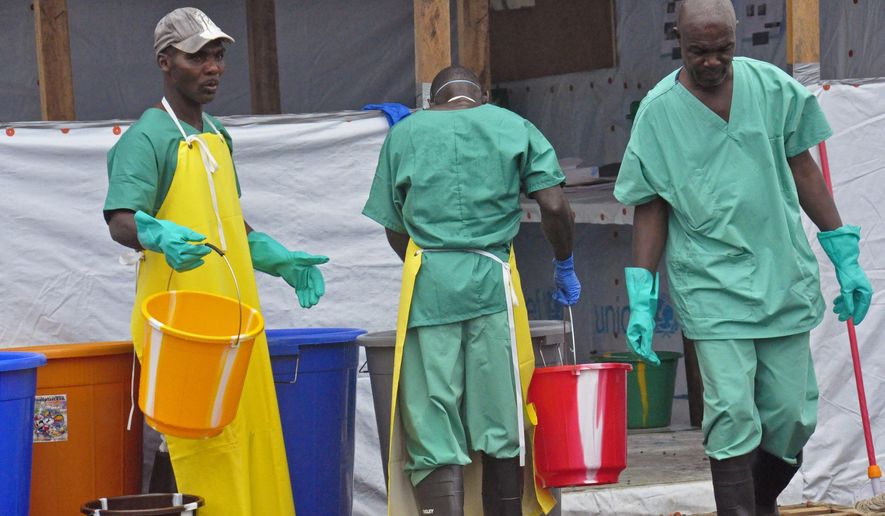In a sign the U.S. considers Ebola to be vanquished, immigration officials are reminding thousands of West Africans to pack their bags and return home or risk deportation when their temporary legal status expires in one month.
The Department of Homeland Security granted more than 4,500 people from Liberia, Sierra Leone and Guinea special permission to live and work in the states after a deadly Ebola outbreak ravaged their home countries from late 2013 to early 2016.
Health officials cleared those countries of transmission last summer, and the Obama administration in September said West Africans shielded by “temporary protective status” in the U.S. had eight months to get out.
Despite years of slippery deadlines under the program, Trump administration said it has no plans to budge from the May 21 cutoff, so those who have no other grounds to stay should book their flights.
“DHS urges individuals who do not have another immigration status to use the time before the termination becomes effective in May to prepare for and arrange their departure from the United States or to apply for other immigration benefits for which they may be eligible,” it said last week in a regulatory notice that served as a one-month warning.
Those who ignore the order would lose their ability to work legally within the U.S. — making it much more difficult to stay — and face deportation if they run into law enforcement or immigration officials.
Temporary protected status, or TPS, is a benefit granted to non-citizens who are in the U.S. but would face imminent danger from natural disasters, ongoing violence or other adverse conditions if they returned to their home countries.
For instance, thousands of Syrians in the U.S. were granted protected status amid the ongoing civil war, while Haitians were granted protected status after the devastating earthquake in 2010.
The Ebola outbreak in West Africa killed more than 11,000 people and sparked a global panic, with some governors in the U.S. imposing strict quarantine measures on people returning from the hot zone.
Yet Liberia, Sierra Leone and Guinea by far bore the brunt of epidemic, prompting a massive international aid response. Responders started to get a handle on the outbreak in by late 2015, though a series of flare-ups stretched the danger into mid-2016, and U.S. aid workers are still assisting the recovery.
“While the impacts of the epidemic pose a lasting challenge to Liberia’s economy and the capacity of its health system to provide treatment for preventable or treatable conditions, at this time, the [Ebola] epidemic has subsided, and conditions have improved since the Secretary initially designated Liberia for TPS,” Homeland Security said in its recent notice.
U.S. Citizenship and Immigration Services said as of the start of this year, the majority of TPS beneficiaries from the Ebola outbreak — 2,313 — were from Liberia, 1,180 were from Sierra Leone and 1,009 from Guinea. Officials said they couldn’t speculate on how many of them might have already left.
Advocates for Liberians are disappointed, saying many of those displaced by Ebola have been unable to find other forms of residency and will have their lives and families upended next month.
“As such, these Liberian families and individuals face the toughest of time. These Liberian heads of families and individuals will be out of work, and will not be able to have access to many other things including certain Social Security and economic benefits. Moreover, they face mental torture and imminent deportation at any time,” J. Nhinson Williams, an advocate for Liberians in their home country and elsewhere, wrote in a recent opinion piece for Front Page Africa.
Immigration hard-liners say the Trump administration’s decision to stand by the May 21 deadline would be groundbreaking.
Those granted protected status typically receive extensions or new protections. For instance Liberians and Central Americans who entered the program to escape civil war and political upheaval in the 1990s were granted another layer of protection, known as Deferred Enforcement of Departure (DED), before their TPS expired, according to the Federation for American Immigration Reform.
“This would be a much-needed improvement in the temporary protective status program, because it would be the first time that it’d ever proven to be temporary,” FAIR spokesman Dave Ray said.
The organization said the longer people remain under protective status, the more reasons they can find to stay — for instance, they might marry an American, claim their children as U.S. citizens or find an employer to sponsor them.
“They’ve decided they’re going to use this as their ticket to stay in the United States,” Mr. Ray said. “And for a lot of people it’s worked.”
Advocates for protected immigrants say the program serves a valuable purpose, however, and extensions are sometimes warranted.
The American Immigration Lawyers Association on Thursday expressed “grave concern” over the administration’s plan to end protective status for those displaced by Haiti’s earthquake by January 2018.
AILA President William A. Stock said the island country continues to be “ravaged by disease and political instability,” and that Hurricane Matthew only made things worse last year.
“It is impossible to reconcile the notion that our government would consider ending in a few short months TPS for Haitians with the reality of the ongoing humanitarian crisis in a country that is still reeling from the effects of natural disaster,” he said.
• Tom Howell Jr. can be reached at thowell@washingtontimes.com.




Please read our comment policy before commenting.